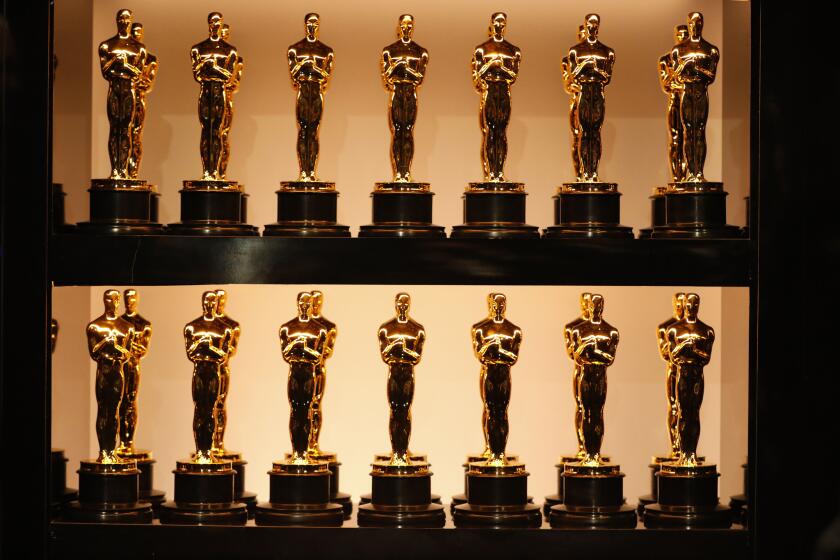The BAFTA Awards have a diversity problem. So they’re making over 120 changes

- Share via
Winning the British film academy’s lead actor honor in February, Joaquin Phoenix said he felt conflicted accepting the prize because “so many of my fellow actors who are deserving don’t have that same privilege.”
“We send a very clear message to people of color that you’re not welcome here,” the “Joker” star added.
The British Academy of Film & Television Arts took several steps today to address that lack of diversity in both its membership and voting outcomes, announcing wide-ranging changes designed to bolster inclusion for underrepresented groups and promote a more level playing field for films competing for its annual BAFTA honors.
Producer Marc Samuelson, chair of BAFTA’s film committee and part of the steering group behind the internal review that prompted these changes, says the academy can’t commission films or dictate what kinds of movies are made. But it can lead by example.
“We can’t change the industry, but we can try,” Samuelson says in a Zoom call from London. “We can sort out our side of the street and get BAFTA to become the kind of organization that everyone hopes it would be, which is truly representative and, in terms of the awards BAFTA gives, let the work be seen and be judged with fairness.”
To that end, BAFTA has committed itself to more than 120 changes, including the goal of adding at least 1,000 new members from underrepresented groups in the next two years and overhauling its voting process to ensure members watch more movies. BAFTA members will also be required to participate in a “conscious voting training” program that will, Samuelson says, point voters to the “issues around social dominance and perhaps just give people some pause for thought.”
The BAFTA changes arrive two weeks after the group’s American counterpart, the Academy of Motion Picture Arts and Sciences, announced new representation standards for films to be eligible for the best picture Oscar. Those standards require movies to meet two of four requirements — representation on and behind the camera, internship and training programs for underrepresented groups and diversity in the publicity and marketing teams.
Starting in 2024, movies will need to meet specific inclusion standards in order to be eligible for the best picture Oscar.
The motion picture academy also welcomed 819 new members in June, announcing that it had surpassed its goal, set in 2016 in the wake of the #OscarsSoWhite controversy, of doubling the number of women and people in underrepresented communities in the group by 2020.
BAFTA weathered criticism earlier this year when it announced an all-white slate of acting nominees and failed to nominate any women for directing in a year that was particularly strong for female-helmed films. (The U.S. film academy also shut out female directors, including “Little Women” director Greta Gerwig, and recognized only one performer of color with an acting nomination — “Harriet” star Cynthia Erivo, who happens to be British.)
“I don’t think anybody wants a handout or preferential treatment,” Phoenix said from the BAFTA podium, “although that’s what we give ourselves every year. I think that people just want to be acknowledged and appreciated and respected for their work.”
The new BAFTA voting procedures, effective with the upcoming awards season, will consist of three rounds. For best picture, members will rank up to 15 movies, with the top 15 overall making a long list. Members will be required to watch all 15 films before ranking their top five picks. The five films receiving the most votes will advance to the final round.
Balloting for the acting and directing categories contain extra wrinkles. Acting chapter members will rank up to 15 performances. The top dozen will make a long list, and then a jury will select three additional picks from the performances ranked 13-22. From that pool of 15, a jury will select six nominees for each category.
Directing chapter members rank up to 20. The top eight female and the top eight male directors will be long-listed, with a jury adding an additional two men and two women from the next-placed films. From those 20 listed, a jury will pick six directing nominees.
“After that first stage, it’s gender balanced,” Samuelson says. “To be reductive: Is there a guarantee of a female director being nominated? Nope. But that extra level of intervention makes for a level playing field. We hope that’s an elegant way of doing it.”
The BAFTA steering group met 50 times the last few months, interviewing 402 people about the group’s future and failings of the past, including how, say, two-time Oscar winner Denzel Washington has never earned a BAFTA nomination over the course of his long, celebrated career.
“It’s inexplicable, other than seen in context of everything we’re doing in the entire report,” Samuelson says of Washington’s absence. “It’s very strange. I don’t think conjecture is really helpful.”
More to Read
Only good movies
Get the Indie Focus newsletter, Mark Olsen's weekly guide to the world of cinema.
You may occasionally receive promotional content from the Los Angeles Times.












